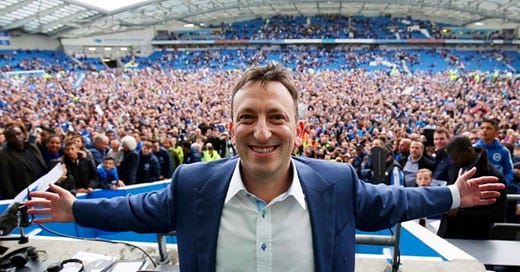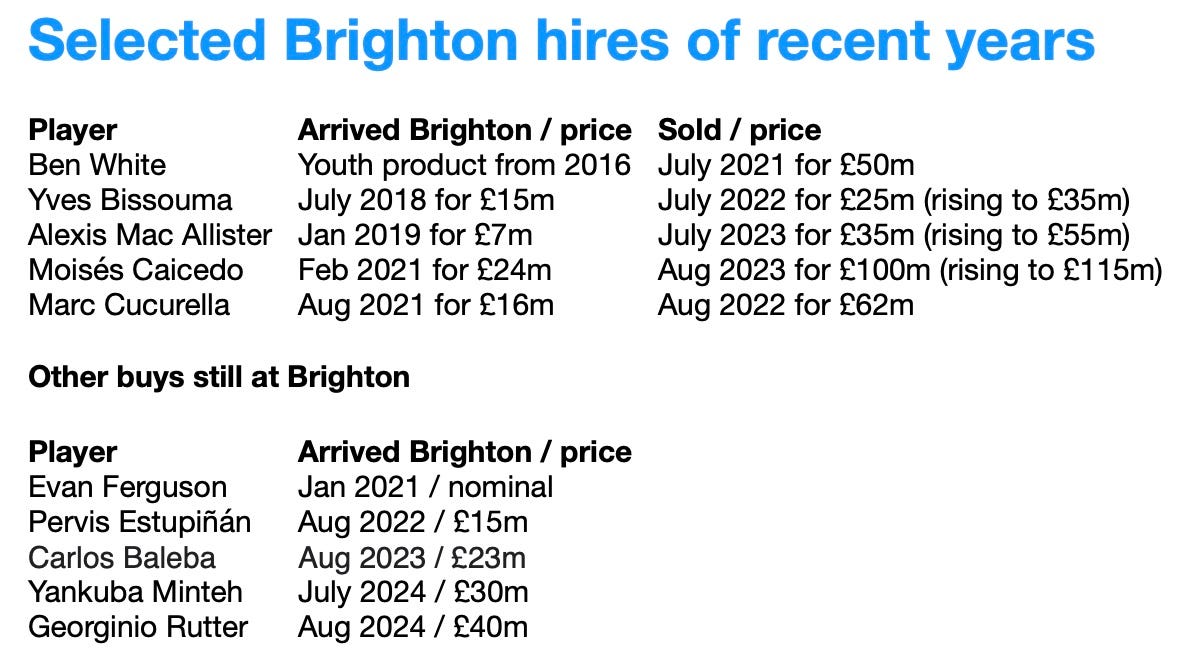Brighton owner on cusp of a deal to shake up Scottish football and make Hearts bloom
Tony Bloom has transformed Brighton from top to bottom since 2009, with data at the heart of his success. He believes he can now help Hearts on a similar journey
This piece was commissioned for the new Nutmeg Substack and I’ll be writing for them once a month from now on. Those pieces will appear here, and over there. More about Nutmeg, the Scottish Football Quarterly, later.
Tony Bloom is a visionary entrepreneur, a tech pioneer and quite possibly a billionaire, but he’s so protective of his private life that nobody knows the precise size of his wealth.
He owns Brighton of the Premier League - aka Brighton, the best-run club in the richest and most popular football league in the world.
And he appears to be closing in on an acquisition of a slice of Hearts of the Scottish Premiership that could transform the landscape of Scottish football.
Any deal wouldn’t be about money, per se, although it’s been reported that Bloom (below) could invest up to £10m to pay for a stake and inject some capital.
It definitely would be about the top secret talent-spotting algorithm and best-in-class data that has underpinned Brighton’s extraordinary rise in recent times.
We’ll come back to those details in a moment.
Sporting Intelligence has been delving into the background of the putative link-up and a variety of sources close to both Bloom and Hearts have told me:
Bloom is pursuing his interest in Hearts in a personal capacity because he believes they have potential, over time, to mount a challenge to the duopoly of Celtic and Rangers, by spending smarter, not bigger, as Brighton have done in recent times.
Initial talks between Bloom and Foundation of Hearts - which is effectively the fan-controlled collective who are majority owners of the club - started in December last year. Neither side will confirm specifics at this stage but it is understood that Bloom is ready to invest between £8m and £10m in equity to take a stake of between 20% and 25% of the club.
Hearts have already been working with Bloom’s Jamestown Analytics, an offshoot of the data firm Starlizard, founded by Bloom but no longer owned or run by him. Jamestown were instrumental in the identification and hiring of Neil Critchley as Hearts’ new head coach this month. “I’m very happy to be able to welcome Neil to Hearts,” Hearts’ chief executive, Andrew McKinlay, said. “We’ve made no secret of the fact that analytics has guided our search for a new manager and that data presented us with many top-quality options, including Neil.” Hearts have played two games under Critchley: a 4-0 win over St Mirren in the league and a 2-0 win over Nicosia last night.
One source also says Jamestown and Bloom were also involved in the recent appointment of Hearts’ new sporting director Graeme Jones, recruited from his position as the Scottish FA’s head of performance.
The finalisation of an announcement of the Bloom-Hearts tie-up has been delayed, in part, two sources say, because Bloom is meticulous about detail and wants to be certain any link doesn’t fall foul of - albeit lax - governing body rules relating to MCO (multi-club ownership).
Parties on both sides tell me that Bloom wants to be able to influence strategic decisions at Hearts, as he does at Brighton, but once broad targets are agreed (on-pitch success, best-in-class recruitment and player development), he wants to let the day-to-day management team of his CEO and other directors get on with their jobs and not interfere. The same is true at Brighton.
Hearts won’t become a “feeder club” for Brighton. If there are benefits in certain situations where one club can help another, that’s all well and good. But Bloom’s vision for Hearts is to make them competitive in Scotland, and build them up as he has built Brighton up.
As recently as 1997-98, Brighton finished 23rd in the fourth tier of the English football pyramid, just one place above Doncaster Rovers, who were relegated to the non-league.
Some rollercoaster years in the Noughties saw the Seagulls rise and fall from the fourth tier to the second-tier Championship and back to the third-tier League One.
Bloom, 54, is a lifelong Brighton fan whose uncle is a club director and whose grandfather was the vice-chairman in the 1970s. He himself has been chairman since 2009 after buying 75 per cent of the club and injecting the thick end of £400m since then.
A significant chunk of that cash was spent on the AMEX Stadium and on the state-of-the-art Elite Performance Centre training complex in Lancing, 14 miles away.
Brighton spent six years in the Championship from 2011 to 2017 and then reached the PL - the Promised Land, the Premier League - in 2017, where they have stayed since.
Quiz question!
Only eight current Premier League clubs have never been relegated from the Premier League - without looking, who are they?
Yes, that’s right: Arsenal, Chelsea, Everton, Liverpool, Manchester United, Tottenham, Brentford … and Brighton.
In 2022-23 Brighton finished as high as 6th, therefore qualifying for European competition for the first time in their 122-year league history.
Their first ever European fixture was on Thursday 21 September 2023 and I was privileged to be there, with an “access all areas” pass as part of a nine-day “embedded” stint behind the scenes at the club.
What follows includes a summary of that week, and what it says about the motivation and commitment of Bloom to the clubs where he becomes involved, and to the quality of the executives and staff he trusts to deliver his vision.
If I were a Hearts fan, I’d be quite excited.
Bloom has (positive) form in taking stewardship of a club that has once been great and restoring it to former glory. He invested in Royale Union Saint-Gilloise (Union SG) of Belgium in 2018 at a point when they had not played in Belgian’s top division for almost 50 years and their 11 league titles could only be seen in sepia.
Within three seasons they were promoted back to the top division, where they finished as runners-up twice, qualified for Europe and won a domestic cup.
No club in Scotland bar the Old Firm has won the Scottish league title since Aberdeen in 1985. Hearts were most recently the champions in 1960. Their last trophy was the Scottish Cup in 2012, when they beat Hibs 5-1 in the final.
Hearts’s only other significant silverware since the Millennium was their Scottish Cup win in 2006, ending that crazy Romanov-era season with a win on penalties over Gretna at Hampden.
It’s the algorithm, stupid!
If there is a single thing that might probably be transformative at Hearts under Bloom - as and when a link-up is formalised soon - then it’s assisting the recruitment process via Jamestown’s algorithm.
You can read about my nine days with Brighton via this thread, which contains links to numerous pieces about what, for me at least, was a fascinating opportunity to see inside an extraordinary project at a pivotal time.
Spending time with Dave Weir, the club’s technical director, was never going to elicit the “secret sauce” of the recruitment algorithm. Weir doesn’t know all the ins and outs himself, and even if he did, he basically said if he told me, he’d have to kill me.
But suffice to say the algo takes into consideration more metrics about more players from more places than any other similar system, and then analyses that data in a better way.
The graphic below gives a snapshot of some of the positive results in recent times.
In an interview with the Sunday Times at the weekend, Jamestown’s managing director, Justin Said, said: “It’s very hard to quantify [how far ahead we are of the competition], but I believe what we have is the best out there, so it’s important that the integrity of our data and what we do is upheld.
“It’s our own bespoke data. Now, the algorithms and how they come to form, I can’t talk about. But once it gets to us, we refine it and tailor it really carefully for every single club so, in theory, it should only be useful to them. And we’re very selective about the clubs we want to work with.”
Weir added: “We’re fortunate to have access to all the information from every league in the world, which you’d never be able to cover on a scouting, subjective, eyes-on basis.”
But it’s not all about data. Brighton have a club policy of “no dickheads”. Weir told me this. CEO Paul Barber told me this. If Brighton find a player who is off the scale in terms of his analytics but, via traditional scouting and background research, they find out he’s “problematic” in any sense, they won’t sign him.
The other positive that Hearts fans should know is that Bloom actively encourages the recruitment and promotion of local people, and fans, within the club, in all areas. Many of the departmental heads at Brighton are people who have been fans since childhood.
Something genuinely transformational could be happening at Hearts, and soon.
The new Nutmeg Substack offers brilliant football writing, made in Scotland, with all the content currently available free to all subscribers. Nutmeg also continues to exist as a hard copy quality Quarterly, published four times a year since Autumn 2016. My first piece for Nutmeg was about Scotland’s Millennium Bug and the second was about the dearth of Scottish talent in England’s elite division. For more information about subscribing to that, there’s more information here.







Great read as always but I think you meant Brentford, not Bournemouth in your list of not relegated clubs.
Fantastic read and as a Hearts fan we're all pretty excited about what this could mean for us. One slight correction. We won the Scottish Cup in 2006 but the end of cup win at the end of the Romanov era was in 2012. We thumped the Hibs 5 - 1. That's the sort of thing that lives long in the memory.